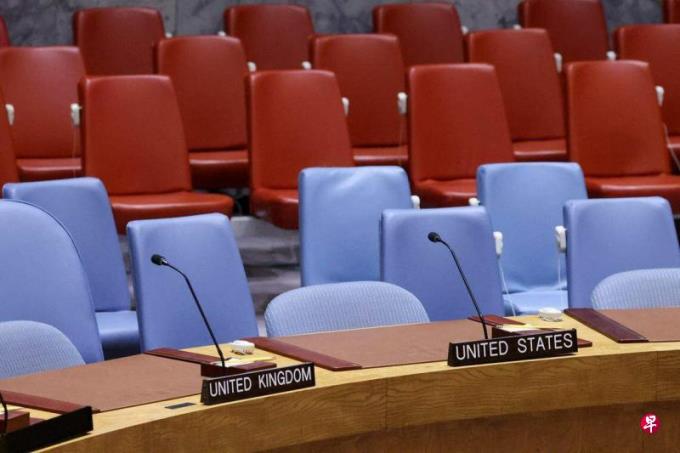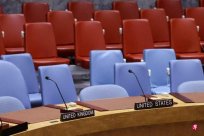
Why did the previous ceasefire motion of the Security Council were blocked?
The United States had exercised veto in October, December, December, and February last year to block the draft resolutions of the Harbin -Harbon.The attack on the 7th and the negotiations that may affect the release of hostages.
The United States proposed an appeal to immediately and continued to stop for six weeks this month to protect the draft resolution of civilians in Gaza and let assist of supplies enter Gasha.Russia's veto.
Zhang Jun, a permanent representative of the United Nations, explained that the draft resolution in the United States is obviously different from the resolution passed by the Security Council on Monday (25th).The latter has a clear attitude and correct direction. It is required to stop the fire immediately, reflecting the general expectations of the international community and supported by the Arab state.Zhang Jun explained to why he rejected the agreement made by the United States and in favor of the latest agreement.
The United States accused China and Russia's vote on Friday because the resolution condemned Hamas, and more because of the "small instrument" of China and Russia, they were unwilling to vote for the draft resolutions proposed by the United States.
Why did the United States be discarded this time?
The U.S. Permanent Representative of the United Nations Greenfield explained that the resolution was included in some suggestions from the United States, but the United States did not agree with the entire content of the decision text, so he chose to discard the votes.The resolution did not condemn Hamas, nor did it directly linked to the release of hostages to the ceasefire, and these were the main requirements of the United States.Greenfield emphasized that Hamas must accept an agreement with Israel, and the release of hostages and ceasefire must be carried out at the same time.
In the early days of the Harbin conflict, the United States had been opposed to the word "CEASEFIRE", and only agreed to fight with "suspension".However, with the intensified crisis of Gaza and the Security Council has been criticized for inaction, the United States has begun to transform, and is currently promoting the suspension of Harbin for six weeks.
Although the United States has denied a change in the conflict of the Harbin, the voter vote reflects the United States' attitude towards Israel.Regardless of the United States' opposition, the United States insisted on launching ground wars with the La Fa in the southern part of Gaza, so that the United States faces increasingly domestic and foreign pressures.
What if Israel does not execute the resolution?
According to international law, the UN Security Council's resolutions are binding, but all parties may have different interpretations of resolution texts, making it difficult for resolutions to implement and often ignore.U.S. officials said that the resolutions passed on Monday are not binding; Algeria, Malta, Mozambique and other countries have opposite opinions.
Mark Lyall-Grant, formerly the represented by the UK's resident in the United Nations, pointed out that this resolution is only legal to Israel and Hamas, which is Africa.According to the resolution, Israel is obliged to stop military operations in the next 10 days, that is, the days of fasting for more than a month.
If Israel does not follow the agreement, this will affect its international image, and some countries may call for sanctions on it.However, because the United States does not think that this resolution has binding power, it means that the United States is unlikely to allow the Security Council to pass relevant sanctions resolutions.
How does this affect the United States?
The US acquiescence Security Council has passed the draft resolutions opposed by Israel, highlighting that the differences between the two countries are expanding.Israel canceled the delegation to Washington for the first time, causing the United States to persuade the U.S. military to give up the efforts to abandon La Fa to face obstacles.
If Israel really launch a large -scale offensive against Lafa, this will trigger question whether the United States should restrict the military aid of Israel, and the relationship between the two countries may further deteriorate.
The presidential election was held at the end of the United States, and Biden, who seemed to be re -elected, was facing pressure from domestic and foreign and asked him to curb Israel's military operations.The Israeli Prime Minister Neganahu also faced the pressure of downstream because of the conflict of Harbin. He must take a strong stance on the Palestinians. At the same time, he convinced the Chinese to try his best to rescue the hostages in Hamas's hands.
Analysts believe that although Biden was dissatisfied with the persuasion of Neahuahu, it seemed to be trying to prevent the disagreement between the two countries. It is expected that the Security Council's resolutions will not cause a fatal blow to the United States.Judging from the planning of Israel's Secretary of Defense Garrant this Tuesday (26th) as planned in Washington, the two governments still maintain close communication.




